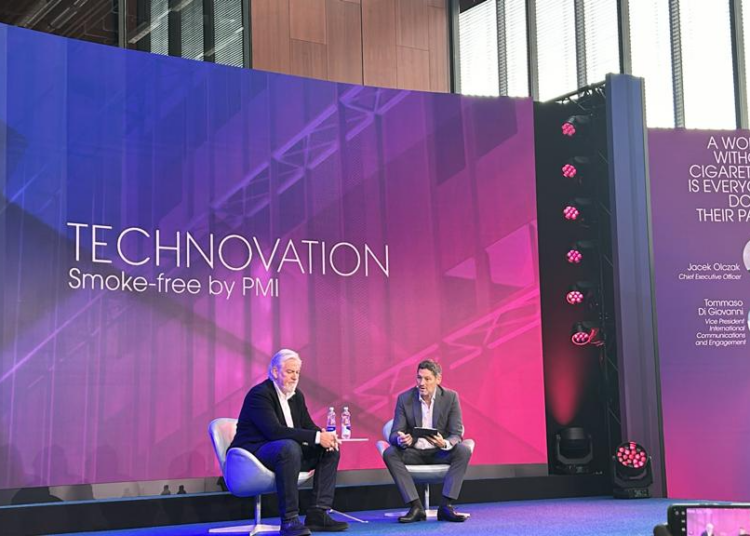Experts have called for the harnessing of the full potential of innovation and evidence-based policies that are needed to steer collective efforts toward eliminating smoking.
This was part of the collective efforts to accelerate the journey to a smoke-free future at the Technovation 7 event organised by Philip Morris International (PMI) in Switzerland.
Media representatives from nearly 30 countries convened at Technovation to hear presentations and engage in discussions about the roles that the industry, civil society, governments, and the public health community play in achieving a smoke-free future at a faster pace.
On October 31, 2023, Philip Morris International Inc. hosted its seventh Technovation at the Cube, the company’s R&D center in Neuchâtel, Switzerland.
Technovation provides media with the opportunity to interact with senior leaders, scientists, and R&D experts from PMI.
During the event, conversation among media and other stakeholders from around the world focused on the crucial roles that innovation, technology, and science can play in enabling a better future for everyone.
PMI CEO Jacek Olczak reiterated this in his recent remarks, urging all stakeholders to objectively assess the facts that support the implementation of policies promoting access to noncombustible alternatives for adult smokers.
“It is no longer a case of if smoke-free alternatives are better than cigarette smoking; it is a case of by how much,” said Olczak.
“Based on WHO and other third-party data, our hypothetical model shows that if smoke-free products are assumed to be 80% less risky than cigarettes—and if people who currently smoke were to switch to them completely—then over their lifetime, there’s a potential for a tenfold reduction in smoking-attributable deaths compared with historical tobacco control measures alone. While this type of hypothetical estimate has limitations, it begins to show the cost of inaction. It’s time to work toward a common goal of delivering effective policies that make cigarettes a historical artifact—a museum piece collecting dust behind glass cases.”
PMI’s Senior Vice President of External Affairs, Grégoire Verdeaux, while reinforcing these sentiments, led
a discussion on what success looks like when regulating smoke-free alternatives.
Citing Italy, Japan, New Zealand, Sweden, the U.K., the U.S., and other countries, Verdeaux made the case for inclusive and innovative frameworks that have complemented traditional tobacco control measures in
expediting the decline of smoking.
“The number of smokers globally has remained virtually unchanged for the past 30 years,” Verdeaux said.
He said the upcoming session of the Conference of the Parties (COP10) to the WHO Framework Convention on Tobacco Control (WHO FCTC) in Panama next month, is a crucial juncture to change the global smoking rates status quo.
“The WHO FCTC COP 10 could be used an as opportunity to bring all stakeholders together to consider the comprehensive science on nicotine alternatives and create guidelines that can unlock harm reduction for hundreds of millions of smokers around the world,” Verdeaux said.
“Unfortunately, this is not the case, but we hope that this will change in future for the benefit of a billion smokers and global public health.”
PMI’s Vice President of Global Communications, Tommaso Di Giovanni, said innovation must be encouraged in the tobacco industry and provided an update on PMI’s ambition to become a majority smoke-free business, with smoke-free products now accounting for over 36% of total net revenues, following third-quarter financial results.
Vice President of Global Scientific Engagement, Gizelle Baker and Vice President of Product & Process Technology, Luca Rossi, demonstrated the rigor and transparency that govern PMI’s science-driven approach.
They took the time to dispel myths about nicotine and emphasized that combustion is the primary cause of smoking-related diseases.
Gizelle said: “Science around smoke-free products is no longer a debate.
She said: “The extensive and rigorous studies have demonstrated that compared with smoking, switching to our smoke-free products result in a significant reduction in the risk of smoking-related disease.”
President of Smoke-free Inhaled Products and Chief Consumer Officer, Stefano Volpetti, said “no smokers should be left behind.”
“Consumers have the right to accurate information about and access to these products,” he said.
“This right needs to be balanced with protecting unintended audiences such as youth,” Volpetti said.
“While blocking youth access should always be a priority, prohibitionist approaches to disable access to smoke-free alternatives for all smokers can result in perpetuating smoking rather than helping smokers switch to a less harmful smoke-free alternative,” she added.











